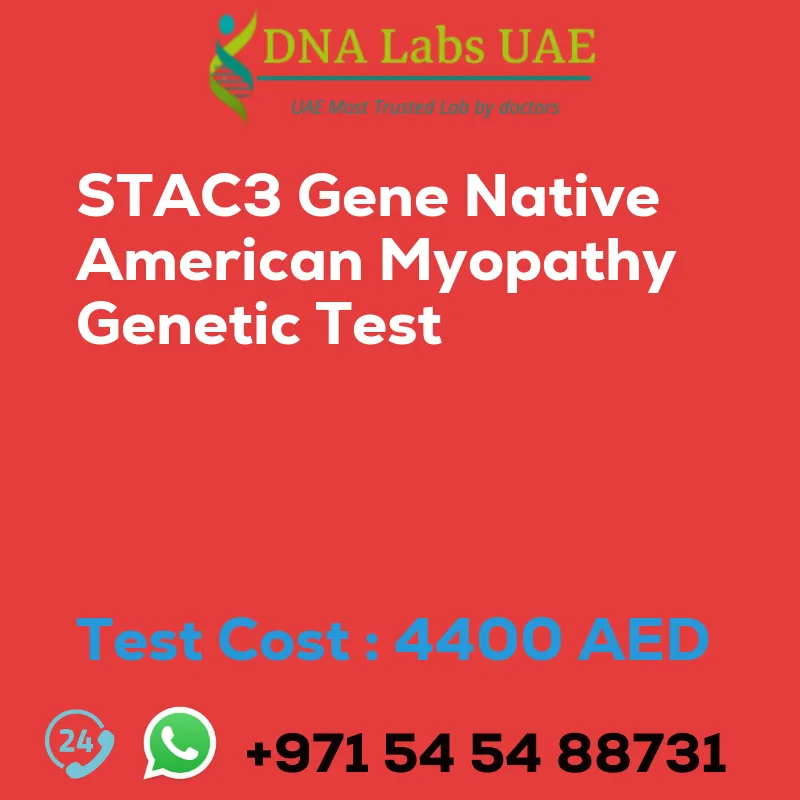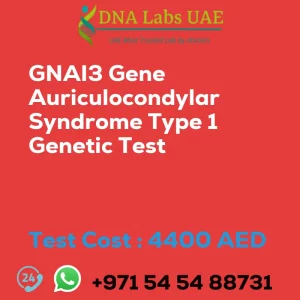STAC3 Gene Native American myopathy Genetic Test
At DNA Labs UAE, we offer the STAC3 Gene Native American myopathy Genetic Test to help diagnose and manage this rare genetic disorder. This test analyzes the DNA sequence of the STAC3 gene using NGS (Next-Generation Sequencing) technology.
Test Components and Price
The STAC3 Gene Native American myopathy Genetic Test is priced at 4400.0 AED. The test requires a blood sample, extracted DNA, or one drop of blood on an FTA Card.
Report Delivery
After the sample is collected, the report will be delivered within 3 to 4 weeks.
Method
The STAC3 Gene Native American myopathy Genetic Test utilizes NGS technology to sequence the entire coding region of the STAC3 gene and other relevant genes.
Test Type and Doctor
The test falls under the category of Dysmorphology and is conducted by our experienced Pediatrics doctors.
Test Department
The STAC3 Gene Native American myopathy Genetic Test is carried out in our Genetics department.
Pre Test Information
Prior to undergoing the STAC3 Gene Native American myopathy NGS Genetic DNA Test, it is important to provide the clinical history of the patient. Additionally, a Genetic Counseling session will be conducted to draw a pedigree chart of family members affected by the STAC3 Gene Native American myopathy.
Test Details
The STAC3 gene is associated with Native American myopathy (NAM), a rare genetic disorder characterized by muscle weakness and wasting, particularly in the limbs. This disorder primarily affects individuals of Native American descent.
NGS genetic testing is used to analyze the DNA sequence of the STAC3 gene and identify any mutations or variations that may be present. This testing method can confirm a diagnosis of Native American myopathy and provide information about the specific genetic variant causing the condition.
NGS testing involves sequencing the entire coding region of the STAC3 gene, as well as other relevant genes, to detect any abnormalities. It can identify small genetic changes, such as single nucleotide variants (SNVs) or small insertions or deletions (indels), as well as larger structural variations.
Genetic testing for Native American myopathy is beneficial for individuals suspected of having the condition, as it provides a definitive diagnosis and helps guide treatment and management options. It is also useful for family members who may be at risk of inheriting the condition, as it provides information about their carrier status and the likelihood of passing the condition on to future generations.
| Test Name | STAC3 Gene Native American myopathy Genetic Test |
|---|---|
| Components | |
| Price | 4400.0 AED |
| Sample Condition | Blood or Extracted DNA or One drop Blood on FTA Card |
| Report Delivery | 3 to 4 Weeks |
| Method | NGS Technology |
| Test type | Dysmorphology |
| Doctor | Pediatrics |
| Test Department: | Genetics |
| Pre Test Information | Clinical History of Patient who is going for STAC3 Gene Native American myopathy NGS Genetic DNA Test. A Genetic Counselling session to draw a pedigree chart of family members affected with STAC3 Gene Native American myopathy NGS Genetic DNA Test gene STAC3 |
| Test Details |
The STAC3 gene is associated with a rare genetic disorder called Native American myopathy (NAM). NAM is characterized by muscle weakness and wasting, particularly in the limbs. It primarily affects individuals of Native American descent. NGS (Next-Generation Sequencing) genetic testing can be used to analyze the DNA sequence of the STAC3 gene to identify any mutations or variations that may be present. This type of testing can help confirm a diagnosis of Native American myopathy and provide information about the specific genetic variant causing the condition. NGS testing involves sequencing the entire coding region of the STAC3 gene, as well as other relevant genes, to detect any abnormalities. It can identify small genetic changes, such as single nucleotide variants (SNVs) or small insertions or deletions (indels), as well as larger structural variations. Genetic testing for Native American myopathy can be helpful for individuals suspected of having the condition, as it can provide a definitive diagnosis and help guide treatment and management options. It can also be useful for family members who may be at risk of inheriting the condition, as it can provide information about their carrier status and the likelihood of passing the condition on to future generations. |







